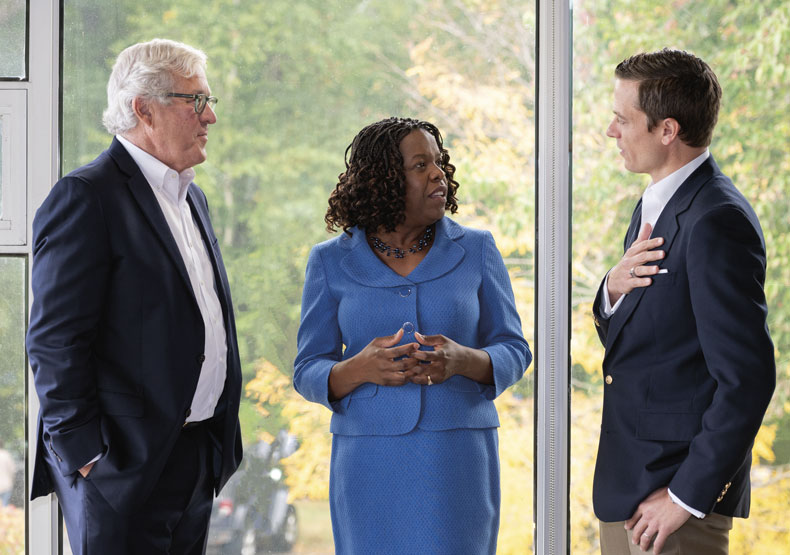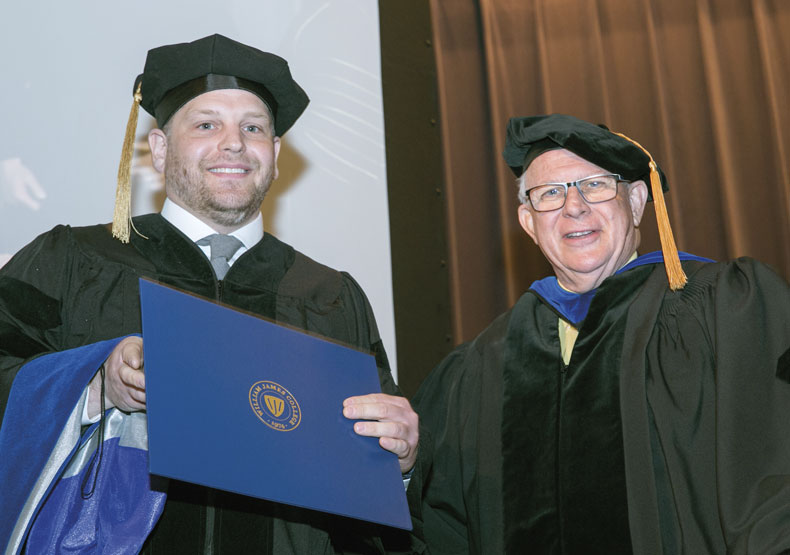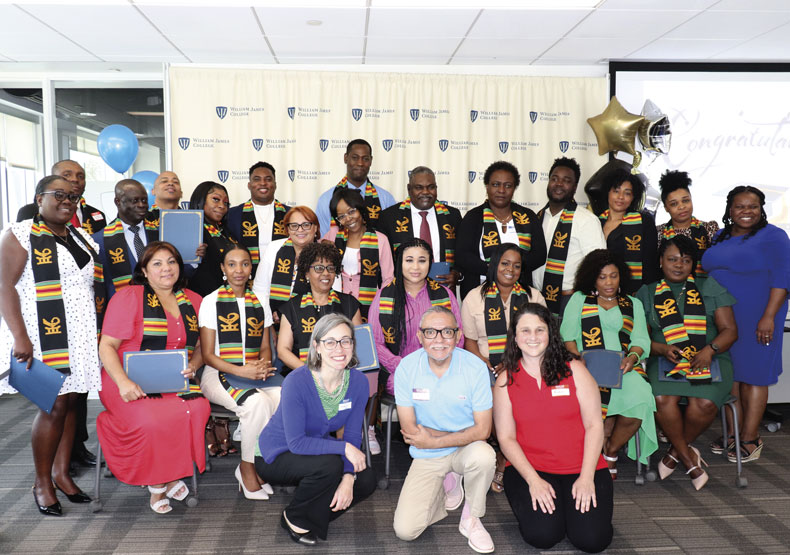Yesterday, Today, Tomorrow: What’s Different About Us at 50 Years?

(L to R) President Nicholas A. Covino, PsyD, Vice President for Workforce Initiatives and Specialty Training, Gemima St. Louis, PhD, and Vice President, Business Development and Strategy, Daniel Tierney.
Since its founding five decades ago, William James College has remained mission-driven to integrate rigorous academic instruction with extensive field education to students keen on meeting the evolving mental health needs of society. What began in 1974 with a commitment to Applied Psychology has evolved to include 13 degree programs in a variety of mental health specialties with an emphasis on attracting and supporting individuals from historically marginalized populations to the field.
As the College marks a half century, a trio of community members shed light on the past, present, and future of William James College and the indelible mark it has left on higher education in the Commonwealth. Among them, a resounding chord emerges: Dr. Nicholas A. Covino’s leadership—in the field of anticipating and meeting community and systemic-level needs—has not only been unparalleled, but it has also allowed for the exponential growth of a school (that began on the third floor of a former dormitory at Newton Country Day) into one of the nation’s preeminent schools of psychology.
In the early 1970s, Alan Dodge Beck, PhD, Dean Emeritus of the Clinical Doctoral Program, was chief psychologist at Trinity Mental Health when he was asked to supervise several graduate students from Massachusetts School of Professional Psychology in their field placement. “They were taking a chance on an institution that had not yet been accredited,” recalls Beck who was amazed by the extraordinary students he met, all keen on pursuing doctoral training outside of a traditional PhD program.
“The integration of teaching, mentoring, and cultivating professional readiness in clinical psychology and clinical practice was the absolute essence of what we aimed to create—and effectively taught—from the beginning,” says Beck, who joined the faculty in 1980. He began teaching Integrative Seminars (the precursor to today’s Clinical Seminars) in concert with Dr. Robert Kegan’s developmental theory course prior to assuming leadership of the program.
“Students were in the field from day one,” says Beck, pointing to active collaboration with field supervisors as seminal in helping to cultivate clinical skills, human awareness, and professional excellence. He counts his own clinical career in private practice, which he maintained throughout his tenure and modeled in the classroom, as a linchpin for educating future practitioners.
“The teaching model integrating self-awareness, clinical knowledge, and a comprehensive awareness of social and human diversity has been foundational to our graduates’ professional success and acclaim since the program's inception,” says Beck who retired in 2018 after bearing witness to the evolution of myriad professional lives over the course of nearly four decades. He remains very proud of what William James College is, how it came to be, and the way it has evolved in both “meeting the need and making a difference” over its many years.

Assistant Professor, Director, Substance Use and Addictions Area of Emphasis, and Alumnus John Meigs, PsyD, with Dean Emeritus of the Clinical Doctoral Program, Alan Dodge Beck, PhD, at William James College 2018 commencement.
Gemima St. Louis, PhD, Vice President for Workforce Initiatives and Specialty Training, arrived on campus in 2013 to spearhead the creation of a multicultural center where programs for historically underserved communities could be developed, overseen, and expanded. Since launching the Center for Multicultural and Global Mental Health in 2015, three additional concentrations—in African and Caribbean Mental Health, Global Mental Health, and Asian Mental Health—complement the College’s inaugural concentration in Latino Mental Health.
With time, a troubling trajectory emerged: A growing demand for more culturally responsive behavioral healthcare, exacerbated by a post-pandemic increase in rates of anxiety and depression, was creating a crucible of sorts.
“Fewer providers entering the field, coupled with an exodus of practitioners, led to significant disparities in access to mental health services in underserved communities,” says St. Louis. In 2021, she was tasked with prioritizing William James College’s focus on diversifying the behavioral health workforce and establishing the Center for Workforce Development.
“We strive to be real-life solution makers and social change agents, which requires intentional and coordinated efforts to recruit and train a culturally diverse workforce,” says St. Louis of the progress made to date. At the start of her tenure, just 7% of WJC students identified as belonging to an underrepresented group; today, that number is 38%.
“We are taking action and addressing an urgent need,” says St. Louis of best practices for creating a culturally diverse workforce. From partnering with agencies located in underserved communities to providing professional mentorship, the process has been steeped with intention. The most significant barrier to first-generation students pursuing masters or doctoral degrees is also being addressed.
Over the past five years, William James College has secured more than $20 million in grant funding to offer scholarships and stipends “in order to lessen the financial burden on students and ensure that they can pursue their dreams without any worries,” shares St. Louis.
Daniel Tierney, Vice President, Business Development and Strategy, joined the leadership team two years ago during a period of growing recognition surrounding the need for trained mental health and leadership professionals who reflect the cultures and communities they serve.
“Our focus on psychology coupled with a commitment to diversifying the profession is what makes us unique,” says Tierney of a strategy that remains integral to future problem solving. As William James College thinks about how to improve equity and maintain mental health in a world that's increasingly hybrid, the College is uniquely positioned to address a burgeoning need.
“Our goal is to make William James College accessible to working professionals by meeting students where they are,” says Tierney in a nod to the increase in online offerings and flexible programming. Geographic growth is poised to complement the enlarged digital footprint.
“We are leveraging our niche expertise to expand programs broadly within New England—and to export our centers of excellence across the country and around the world—to better serve various cohorts and communities outside of Massachusetts,” he says, pointing to a pair of programs in particular. The College’s well-regarded Crisis Response and Behavioral Health program, under the leadership of Dr. Sarah Abbott, recently reached Ireland while the Center for Behavioral Health, Equity, and Leadership in Schools, under the direction of Dr. Nadja Lopez, is delivering invaluable programming for educators—on timely topics such as college mental health—that would be useful for institutions of higher education across the country and around the world.
Driven by a belief that diverse clinicians better serve diverse communities, William James College remains responsive to patient needs by supporting future clinicians. Intentional steps, such as adjusting the strategic plan to account for expenditures—including stipends via the Center for Workforce Development, for instance—remain embedded in the College’s vision going forward.
As William James College embarks on the next half century, our mission—which has endured across yesterday, today, and tomorrow—remains laser focused on advancing the field of mental health in a supportive learning environment that continues to evolve in order to meet the needs of a diverse workforce and our society at large.

Center for Workforce Development Graduation, Community Health Workers Training Program with Justice Resource Institute training partners.
Topics/Tags
Follow William James College
Media Contact
- Katie O'Hare
- Senior Director of Marketing
- katie_ohare@williamjames.edu
- 617-564-9389
